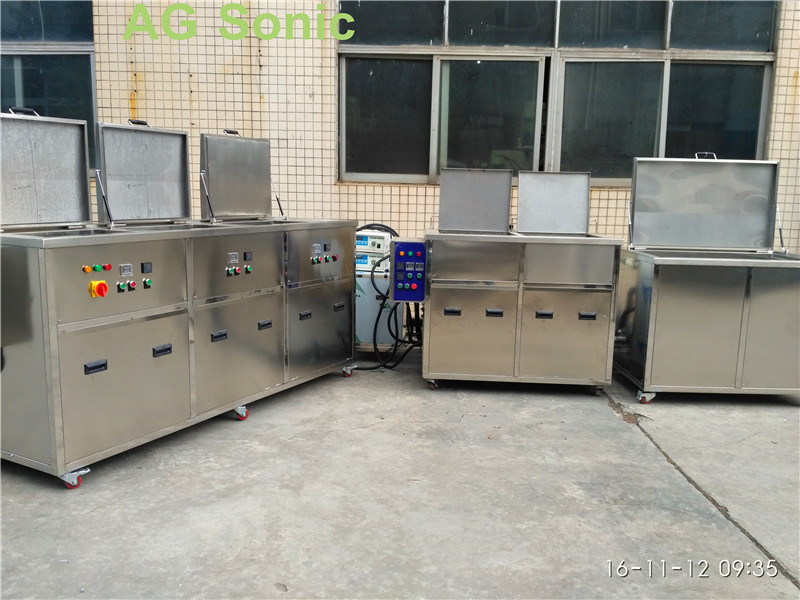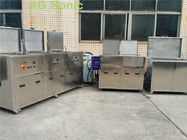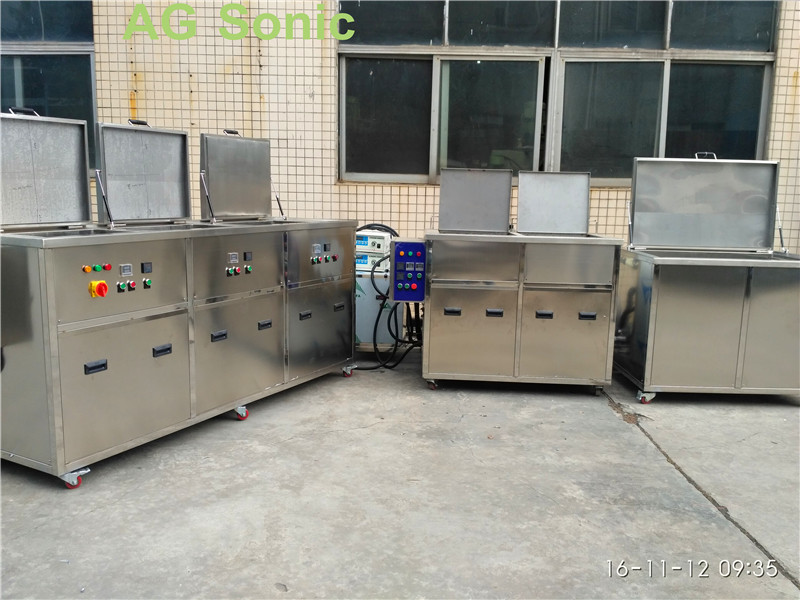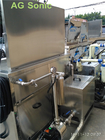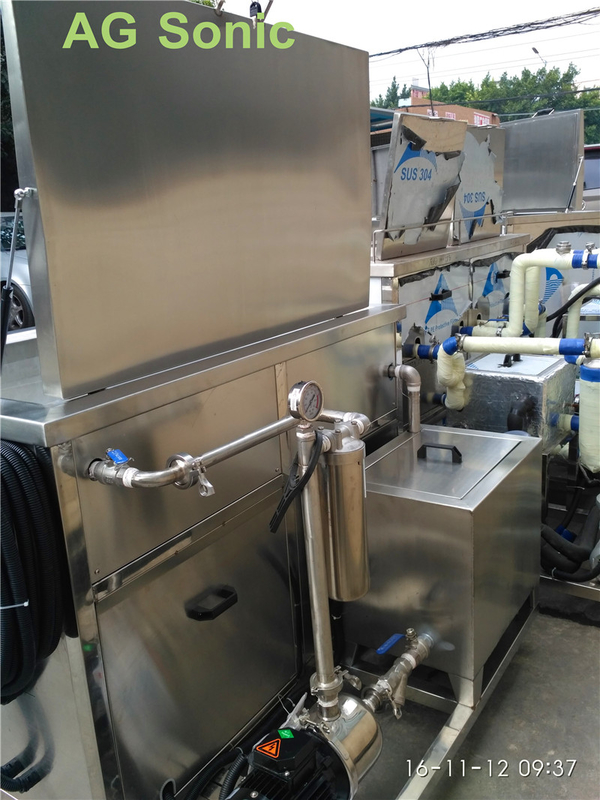Multi Tank Ultrasonic Cleaning Machine For Vehicle Radiators
Ultrasonic Cleaning Machine For Vehicle Radiators In cleaning
Ultrasonic cleaner is, depending on the nature and degree of contamination, applied in a solution of about 4% in cleaning machines. The contaminated object must be placed in the machine and cleaned for 30 - 60 minutes at a temperature of 50 °C - 60°C. Finally rinse with water
Ultrasonic Cleaning Machine For Vehicle Radiators Technology
Ultrasonic technology has been used for many years in the cleaning industry. Ultrasonic technology to clean heavily contaminated equipment, such as heavy fuel oil-filters and heat exchangers. This required developing special chemicals and processes for each application. With many years of experience AG Sonic has the expertise to provide plant operators with simple, effective and fast cleaning systems. Depots worldwide are equipped with the ultrasonic cleaning systems providing continual research and development in the field of ultrasonic and chemical technology.
How are you using the Ultrasonic Cleaning Machine For Vehicle Radiators ?
Ultrasonic cleaners do a lot more than clean parts such as gears, carburetors, PCB boards and surgical instruments. In the lab they are broadly employed to degas solvents, disperse nanoparticles, and emulsify, dissolve, disperse and otherwise prepare lab samples.
Ultrasonic Cleaning equipment Vehicle Radiators Cleaning , to get started you need to consider the following before making a selection:
Type of contamination to be removed. There’s a big difference, as you can imagine, between removing coolant from machined parts, varnish deposits from a carburetor, ink from printing rolls, and blood and tissue residues from surgical instruments.
The composition of products being cleaned. Different parameters apply to cleaning aircraft engine components and glass capillaries. You’ll need compatible cleaning solution and ultrasonic cleaning frequency.
How will the Ultrasonic Cleaning equipment For be used after cleaning?
Ultrasonic Cleaning equipment For Vehicle Radiators Cleaning machine
We are manufacturing and supplying of Automotive Ultrasonic Cleaners. We offer a wide range of ultrasonic cleaners. These are Single or Multistage Ultrasonic Cleaners, which are both manually operated & fully automated systems. Further, the machine is widely used and appreciated by our clients due to its professional dependability and user friendliness.
Ultrasonic Cleaner Vehicle Radiators Clean Industry
Ultrasonic cleaning is a water based cleaning solution where ultrasonic transducers are used to provide cavitation agigation insude the tank which has waer and suitable chemical to clean oil,dirt,debree,grease and other contaminants from various types of auto components.
We expertise in all types of ancilary parts washing like brakepads, steering coloumns, crank shats, pistons, valves, gaskets, clutch pads, mirrors and many more.
What Vehicle Radiators ultraosnic can do ?
Ultrasonic cleaners remove dirt, oils, lubricants, carbon, rust,and other types of grime that build up on engines and mechanical parts. Grooves, internal passageways, seals, and other hard to reach areas are cleaned easily, eliminating hours of disassembling and reassembling complex parts. Carburetors, pistons, cylinder heads, aluminum parts, and brake calipers are a few examples of components that are cleaned thoroughly with no manual scrubbing in an ultrasonic cleaner
Vehicle Radiators Ultrasonic Cleaner It’s efficient, clean, green and cost-effective.
Most importantly, it works.
A powerful cleaning solution is now as simple as soap, water and some mighty little bubbles.
Ultrasonic cleaning technology is fast, gentle and extremely powerful. It uses microscopic cavitation bubbles and specially
formulated eco-friendly solutions to search every crease and crevice and eliminate even stubborn or difficult-to-reach contaminants, including grease, dirt, hydrocarbons, metal
shavings, buffing/polishing compounds, carbon deposits, mold release and more.
Benefits of ultrasonics for Engine Block Vehicle Radiators :
Cleans delicate parts without damage
Cleans cracks and crevices that would be difficult to reach with the hand
Does not require line-of-sight for effective cleaning
Doesn’t use harsh chemical solvents that are dangerous for workers and the environment
Safe for aluminum, magnesium and zinc
Biodegradable cleaner
Clean multiple pieces at once without having to brush by hand – saves time and money
AG ultrasonic cleaning machine effectively and thoroughly clean all types of engine block Cleaning
More suited for refurbishing in an ultrasonic filter cleaner are filters fabricated of metal or plastic mesh that capture and hold contaminants. An ultrasonic parts washer can be much more effective and less damaging than using a brush or high-velocity water sprays that no matter how diligently applied are not able to access all filters surfaces and may in fact damage the filter. Moreover an ultrasonic filter cleaner will cut filter cleaning time to minutes compared to the time required for manually cleaning filters.
Operating an Ultrasonic Filter Cleaner System
Ultrasonic cleaners are available in numerous sizes based on the capacity of the cleaning solution tank, and can range from tabletop models to industrial-sized floor models. Regardless of size they are equipped with ultrasonic generators that excite tank-mounted transducers that create millions of microscopic bubbles in the cleaning solution. These implode on contact with the filters being cleaned to blast away contaminants from any surface wetted by the ultrasonic cleaning solution. Depending on models, ultrasonic filter cleaning equipment such as available have timers, temperature controllers, sweep and degas options. Rinse stations and drying stations are also available for assembly line filter cleaning.
Ultrasonic Cleaning Machine For Vehicle Radiators
|
Ultrasonic cleaning machine :
|
|
Model
|
T-1216S
|
|
Ultrasonic Tank Dimension(mm)
|
1500*1000*1000
|
|
Ovel all dimension(mm)
|
1750*1300*1500
|
|
Max. Capacity
|
1500 L/tank
|
|
Construction Case
|
SUS304 (Mirror shining image available)
|
|
Construnction Tank
|
SUS304
|
|
Transducer Number
|
216 pcs
|
|
Ultrasonic power(Max.)
|
10800W
|
|
Ultrasonic frequency
|
40kHz
|
|
Temperature range
|
Room temperature ~99C adjustable
|
|
Heating power
|
36KW
|
|
Timer
|
1~99h
|
|
Drain
|
1 2/1" Valve
|
|
Lid & Basket
|
Available, material: SUS304
|
|
Cleaning Tank voltage
|
AC220V/AC380V 3phase
|
|
Generator Voltage
|
AC110V / 220V 1phase
|
|
Features
|
For large indsutrial parts cleaning ;
Multi-direction castors with brake;
|
Features:
1. Tank materail is SUS304 with 2mm thickness, Human hand argon welded, Sturdy and durable resistance to high tempearture
2. 50W industrial transducers, outstanding cleaning effects
3. Built-in generator
4. Power adjustable, choose different power according to different cleaning objects
5. Digital timer: 1~99mins timer adjustable. continious working for long time.
6. With memory function, no need to reset time and temperature every time.
7. 20~80C adjustable, powerful heating panel, faster cleaning
8. Industry use power cord, more safer.
9. Can bear 100~200KG cleaning objects
10. Accessories: Machine with stainless steel basket, drainage, lid, movable castors.
Why Use Cylinder Head Engine Block Cleaning ?
Agsonics is renowned for their professional cleaning service to the motor industry.
How does ultrasonic cleaner technology clean?
Cavitation bubbles are vacuum cavities as tiny as red blood cells, or about 8 thousandths of a millimeter across. They are so small that it would take 1,250 of them lined up in a row to reach 1 cm long.
Under pressure of continuous vibration, these bubbles stretch and compress at a fast rate. Once they reach a certain size, as determined by the frequency and strength of the sound waves produced, the bubbles lose structural integrity and collapse violently. When these implosions happen near a surface, the bubbles emit high-powered streams of plasma that travel at more than 500 miles per hour and collide with, agitate and remove even very tiny particles and substances from that surface.

 Your message must be between 20-3,000 characters!
Your message must be between 20-3,000 characters! Please check your E-mail!
Please check your E-mail!  Your message must be between 20-3,000 characters!
Your message must be between 20-3,000 characters! Please check your E-mail!
Please check your E-mail! 
